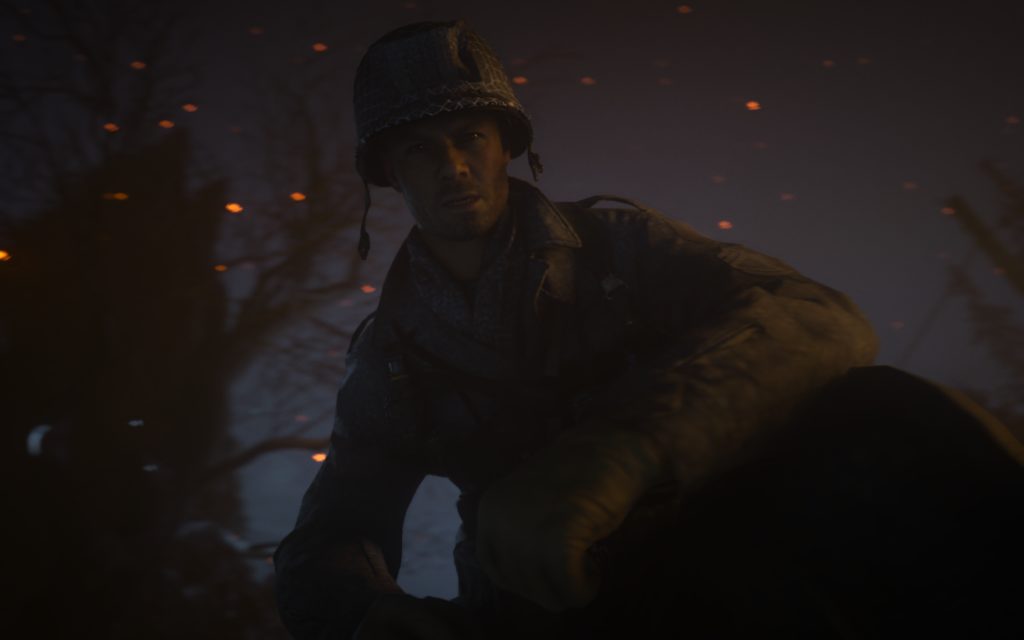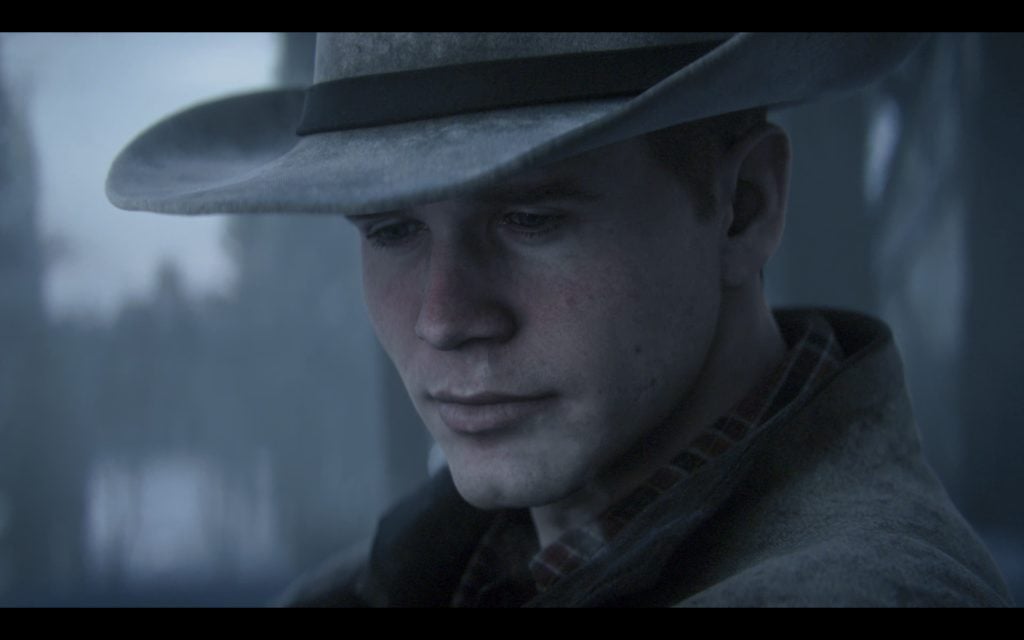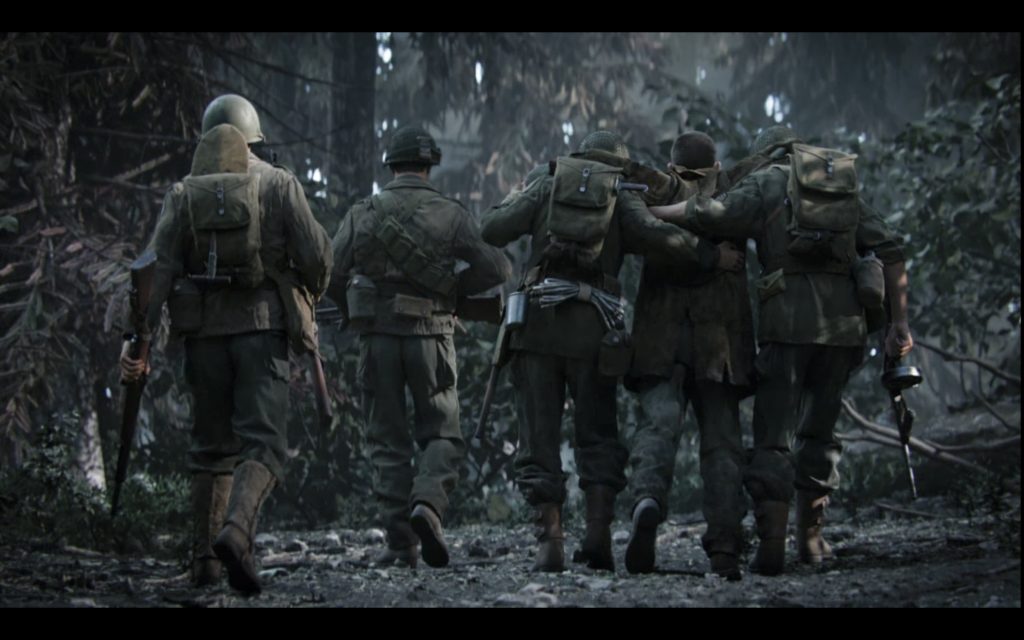Features
‘Call of Duty’ and the Enduring Appeal of World War Two Narratives
The release of Call of Duty: WW2 not only reminded me why stories about the Second World War have such personal resonance – the early CODs were the last games my father and I played together before it became obvious how much of a disappointment I am to him – but it also made me consider their impact on a grander scale.
Throughout history there have always been stories. Stories to inspire. Stories to educate. Stories to terrify or delight. Stories are the foundation of every culture and religion, and the means by which our societies define themselves. From the simplest fable to the most complicated Hollywood saga, stories are the lifeblood of civilization and convey the lessons of one generation to the next in a way that captures the truth in a manner that official records can’t. If Cicero was correct in stating that in times of war the law falls silent, then how fortunate for us that men’s hearts do not. War starkly illuminates the darkest recesses of the male soul, but it can also bring to light parts of us that are often overlooked or outright ignored in contemporary dialogues about men: that being our capacity for good and our ability to form connections with each other even in circumstances that might otherwise seem hopeless.
Connections between men are largely the result of proximity and time, with friendship bonds at their most basic level developing as a result of our simply being willing to tolerate the presence of others in our lives. The stoicism and detachment that are traditionally seen as common masculine traits mean that even at the best of times it can take a great deal of effort to breach our emotional defenses in order to form a bond of any description. However, once such initial resistance has been overcome and a connection created then it is virtually impossible to break it, save for by committing the most egregious of personal offenses. Randomly collecting men together and marching them off to war takes away the option for such selective closeness and makes it possible for others to see us when we are at our best, our worst, and our most vulnerable.

From the opening moments on the beaches of Normandy to the closing hours of the campaign during the Battle of Remagen, it is made abundantly clear that Ronald Daniels is the prism through which players are invited to glimpse the spectrum of male personalities. Daniels suffered an enormous loss during his early years. Such was the magnitude of the experience that it influenced every facet of his development and his outlook on life. As a child he found himself powerless to save his older brother from wounds sustained in a wolf attack whilst they were out together on a hunt.
This is gradually revealed to us over the course of the game through various reflective monologues and flashback cut scenes. Each addition to his narrative helps give added meaning to his personal experiences of, and meditations on, the battles that he is embroiled in. That crucial failure and early exposure to the true meaning of death, remained with him for his entire life and was his primary motivation for disobeying orders and putting the rest of his unit at risk when he decided to do everything within his power to save the man he felt closest to, Private Robert Zussman, after he is captured by German soldiers. His initial attempt fails miserably. He is left wounded and tormented by his inability to once again save someone he deeply cares for.
This has such a profound impact on him that when given the opportunity to leave Europe and return a hero for his discovery of crucial intelligence regarding the German war effort, he refuses. He could not live with himself knowing that he had left a friend to suffer and die. This simple choice reflects that men are capable of a deep and abiding love for others that does not mesh well with the contemporary narrative of our inherent preoccupation with trivial, selfish concerns. Instead, Daniels opts to return to his platoon in order to see the war through and to honor the promise he made to liberate his absent comrade.
When the war is eventually won and what remains of the main cast are patrolling the countryside to locate the infamous camps rumored to be in the area, they find Zussman horrifically emaciated and close to death after harrowing experiences at the hands of his Nazi captors. In the scenes that follow, the denouement of the game plays itself out in a series of sequences that deftly dismiss the modern notion that all men feel are the patriarchal urges to fight and breed. They speak of an urge to belong, to be useful, and ultimately to be loved not for what the world has deemed that they are supposed to be, but for who they truly are.

Joseph Turner, the initial leader of Daniels’ squad, is what many would view as the quintessential commander. He’s tough but fair, willing to listen to suggestions and not afraid to take them on-board if they’re better than his own ideas, and serves as an authority figure without being heavy-handed about it unless he absolutely needs to be. Not all men can actually lead. Having all eyes turn to us in times of dire need can be as terrifying as it is exhilarating, and not everyone has cultivated the qualities required to balance those feelings and responsibilities.
Being a leader is about more than just giving orders and seeing them carried out, it’s also about making decisions and being willing to accept the consequences of those decisions. Turner chooses to make the ultimate sacrifice in order to safeguard the men under his command during the Battle of Hurtgen Forest. After sustaining a grievous wound he stands alone against advancing German soldiers to give his men time to flee and regroup.
I’m far from sentimental when it comes to the deaths of soldiers, it is after all an occupational hazard, one that anyone who wears a uniform must be willing to accept. However, that does not mean that I am ignorant of the significance of those deaths. In being willing to give up his own life to safeguard the lives of those around him, Turner represents the capacity that men have for truly going above and beyond when the need arises.
Little is said about the personal and professional sacrifices that men make on a daily basis in order to support those around them, largely because they are not as dramatic or obvious as dying on a battlefield but the cumulative effect is the same. But we do it willingly and knowingly because we have a desire for purpose and meaning in our lives, as well as the need to contribute to something ultimately greater than ourselves. Turner’s final words are, “No sacrifice too great”, and they neatly encapsulate the essence of our willingness to surrender our entire being to achieve something we believe in.

The other truly notable character, as far as this topic is concerned, is William Pierson. He is the polar opposite of Turner. His command style is hard-nosed and unyielding. He has no time for suggestions or compromise, and his only goal is to achieve victory no matter the cost. Superficially, he would seem to be the “man’s man” that we should all aspire to be, willing to plow through anyone who gets in his way whether they’re the enemy or his own men. But it’s a facade, one he puts on as a result of his inability to process and express his true feelings. He knows that his troops will never feel about him the way they felt about Turner, and as a result of his frustration and guilt he turns to drink.
That’s a gigantic cliche, one that anyone who has even a passing familiarity with this kind of narrative has seen or heard hundreds of times over. Obvious as it is however, it also strikes an unsettling note of truth. I know from personal experience that substance abuse can be a useful tool for coping with feelings of inadequacy and failure. It’s a defense mechanism used to protect yourself from… yourself. Eventually there comes a time when the addiction overwhelms you completely and the man you should be, the man you want to be, is lost in a haze of intoxicants and paranoia.
There is an enormous pressure placed on men, even today, to exude strength and confidence when they might be the last things they feel. The modern man may very well be here to stay, but hundreds upon hundreds of years of sociological conditioning exerts an enormously powerful effect on how men are taught to be men. It’s only by breaking through that conditioning that Pierson is able to discover who he truly is and finally become the leader his men need him to be, rather than the leader he imagines he should be. By tacitly acknowledging his own weakness he is able to find strength in those around him and becomes not just a better soldier but also a better man.
This willingness to be reliant on others is a crucial aspect to masculine development, one that requires you to admit that you’re not infallible or invincible. The inability to reconcile who we are with who we are expected to be is a significant contributing factor to the increase in male suicide rates over the last couple of decades. Characters like Pierson are enormously instructive in terms of demonstrating how to bridge the gap between perception and reality, and how to bring yourself back from the brink of death to find new life.

Individual events within the campaign, although spectacular in their own right, could just as easily be part of any one of the thousands upon thousands of similar stories that have been told across the decades. Factor in the additional truth that the game isn’t even especially historically accurate and it’s plain for all to see that groundbreaking originality was not on the top of the designers’ list during its development. But these kinds of stories don’t have to be unique or original in order to serve their purpose.
On the contrary, their dependence on established tropes and a rigid adherence to character archetypes gives them the kind of instinctual familiarity that lends even the most ancient of Greek tragedies their perpetual relevance. Although it might not do much to advance the cause of gaming narrative writing as a whole, Call of Duty: WW2 brings to the fore many aspects of masculinity that are often glossed over as inconsequential or irrelevant. By highlighting compassion, integrity, and honesty even in situations where those things could feasibly have no conceivable place, its story demonstrates that there is more to manhood than the sexual predation and flaunting of innate privilege that modern discourse would have us believe.
The end of the Second World War marked not only a seismic shift in global geopolitics but it was also a turning point in gender relations in the developed world. Even now as the patriarchy is being rightly shaken to its very foundations, these stories have a unique appeal to men not because they serve as a power fantasy of former glory days but rather because they remind them that the constant barrage of criticism isn’t always justified. It’s for a similar reason that the Marvel cinematic universe has managed to gain such traction at such an incredible rate. Such stories can be dismissed as juvenile flights of fancy but behind all the one-liners, bizarre antics, and fist-fight onomatopoeia are stories that emphasize the best qualities that each of us aspire to in our own more mundane but eminently more practical fashion. Larger than life characters, whether they wear fatigues or spandex, help us all remember that, whether we’d like to admit it or not, we can all be better than we are.

-

 Features4 weeks ago
Features4 weeks agoGet Ready: A Top Isekai Anime from the 2020s Is Headed to Hulu!
-

 Features3 weeks ago
Features3 weeks agoSocial Gaming Venues and the Gamification of Leisure – A New Era of Play
-

 Features3 weeks ago
Features3 weeks agoSolo Leveling Snubbed?! You Won’t Believe Who Won First at the 2025 Crunchyroll Anime Awards!
-

 Culture3 weeks ago
Culture3 weeks agoThe Global Language of Football: Building Community Beyond Borders
-

 Technology4 weeks ago
Technology4 weeks agoIs Google Binning Its Google Play Games App?
-

 Technology4 weeks ago
Technology4 weeks agoHow to Download Documents from Scribd
-

 Guides4 weeks ago
Guides4 weeks agoBoosting and WoW Gold: Why Prestige and Efficiency Drive the Modern MMO Player
-

 Technology2 weeks ago
Technology2 weeks agoGamification and Productivity: What Games Can Teach SaaS Tools
-

 Features2 weeks ago
Features2 weeks agoFarewell to a Beloved 13-Year-Old Isekai Anime That Brought Us Endless Laughter
-

 Features1 week ago
Features1 week agoThis Upcoming Romance Anime Might Just Break the Internet; Trailer Just Dropped!
-

 Features3 weeks ago
Features3 weeks agoWait, What?! Tom & Jerry Just Turned Into an Anime and It’s Glorious!
-

 Culture2 weeks ago
Culture2 weeks agoIs the Gaming Industry Killing Gaming Parties?




















